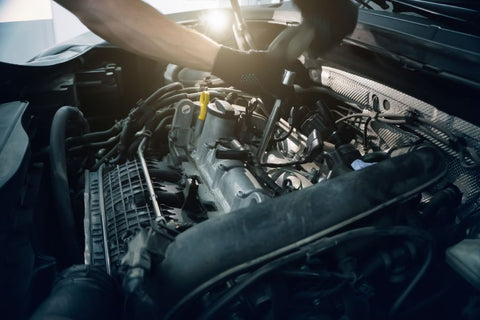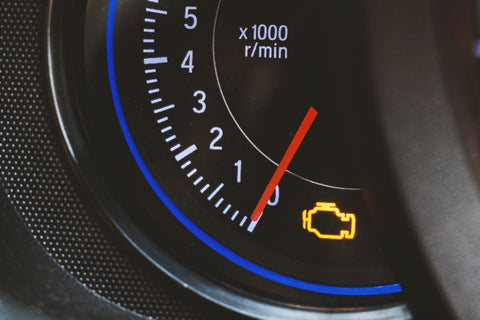Turbochargers are helpful tools when it comes to engine efficiency and power. But these helpful tools can go awry if they’re damaged. One way you can tell your turbo is blown is by the sound it produces. However, what does a bad turbo sound like on a diesel?
Read on as we look at the different turbo noises and what may cause them.
How Does a Turbo Work?
Vehicle engines use fuel and air to produce power that creates a drive. A turbocharger (or simply turbo) works like an air compressor. It provides the engine with more air by using exhaust energy that would go to waste to compress air.
That is, hot exhaust gasses flow through the turbine and cause it to spin. Also, a shaft connects the turbines and pulls in cold air to maintain the temperature compressing it into the engine.
As you cram more air into the cylinders, the engine can produce more power as it can burn more fuel. This is a more economically and environmentally efficient solution than larger engines.
Therefore, the more you rev up your engine, the faster the turbo spins, sucking in more air and producing more power drive.

Source: shutterstock.com / Photo Contributor: DedMityay
What Does a Bad Turbo Sound Like on a Diesel?
The turbo needs maintenance or replacement once you notice weird sounds. These noises can become so loud that you can hear them inside the cabin. Your turbo is going bad if you hear whining, hissing, or whistling sounds.
A failure on the compressor side of the turbo produces a whining noise. A shaft that is out of balance or has too much play can cause this issue. Turbochargers are very tight, and a shaft play of more than 1 mm can be disastrous.
The compressor blades could also be the reason for this sound if they’re bent or damaged. Neglecting this issue can result in the complete collapse of the turbo.
You’ll hear hissing sounds if there’s a leak in the exhaust side of the turbo. You can notice exhaust leaks by the smell in the cabin. Whereas leaks in the charge air ducts can produce whistling sounds.
Recognizing unusual sounds is one of the signs that something is not right and is an essential aspect of understanding what happens when a turbo goes on a diesel.
The sound of a blown turbocharger may be hard to notice at first due to the high rpm of a turboshaft. Remember that it’s time for a turbo replacement once you start noticing it.
Common Blown Turbo Signs
Performance and power loss
The engine's performance is the most noticeable issue of a blown turbo. A turbocharger’s main job is to produce additional power to the engine.
This can be an easy issue to spot since you’ll be aware of your vehicle’s acceleration power. Your initial input could have a slow response. It could manifest in the engine’s struggle to reach or maintain high speeds.
Once you start noticing a dip in power, it's safe to assume a blown turbo might be causing the problem. Thus, you should check your turbo for any signs of damage and consult with a mechanic.
Loud engine noises
Aside from the power efficiency of rebuilt turbochargers, they also muffle engine sounds due to excessive air intake. However, diesel pickup trucks use large turbochargers that make louder noise. So, what does a bad turbo sound like on a diesel?
If you notice any change in the turbo's usual sound, there is likely an issue. Some of the noises can be whining like a police siren, rattling, humming, or whistling.
A turbo with a whining sound is the most telling sign of a blown turbo. Any noticeable change in turbo noise is a sign of concern, and you should have your truck checked out by a mechanic.
Discolored exhaust smoke
Damaged turbo seals or cracked housing can cause oil leaks to reach the exhaust system. This leak can cause your heated exhaust to burn up oil and produce excessive blue/gray smoke as you rev up the engine.
Since vehicle exhaust is colorless, this is an easy sign to spot when you see discolored gasses coming out of the exhaust.
This issue doesn’t always mean it stems from turbocharger failure, but it’s a possibility you should check with a mechanic.
Check engine light
Even though it can be notoriously ignored, the check engine light is your vehicle telling you there’s something wrong under the hood.
However, this indicator is pretty open-ended, so even a turbo failure could be causing it. You should take your truck to a professional mechanic for a detailed diagnostic check on the vehicle’s control unit. This way, you can get a specific error code that could reveal the turbocharger to be the cause of the issue.

Source: shutterstock.com / Photo Contributor: Mai_adjustment
Excessive fuel use
A turbo helps a vehicle with engine efficiency. It allows an engine to produce more power artificially by pumping exhaust air. This should reduce fuel consumption.
However, a faulty turbocharging system can have the opposite effect. If the turbo causes the issue, you’ll be able to see leak spots in the turbines inside the turbo. This can result from a cracked seal, gasket, or similar damage.
Leaving this issue unattended can cause a dent in your wallet by having to refuel your vehicle more often than usual. Hence, it’s best to shop around for a replacement turbocharger at this point.
What Causes Turbo Failure?
Most stock turbos are reliable and show no issues for the vehicle's lifetime. But you can achieve this through proper maintenance. However, there are engine problems or general maintenance negligences that could cause the deterioration of the turbocharger.
Foreign object interference
Foreign objects can go into both of the major components of a turbocharger, the compressor, and the turbine.
Dust particles, dirt, little stones, leaves, and other minor objects can enter the compressor or turbine shaft. Therefore, obstructions caused by foreign objects can damage the turbocharger.
In most cases, the air filter is where foreign objects enter the compressor housing. The issue typically arises from the engine itself if the foreign object damages the turbine.
The damage caused to the compressor wheels or turbine blades will start to deteriorate the overall quality and efficiency of the turbocharger. As a precaution, you should perform proper debris and air filter checks on your turbo.
Incorrect oil lubrication
Applying oil to your vehicle is a key maintenance process. It helps the vehicle run smoothly by lubricating the main moving parts. It keeps them cool while in use and protects them from corrosion.
A turbocharger to run smoothly requires a regular flow of clean and quality oil. Oil starvation or contamination can occur due to a lack of oil, an incorrect oil type, or poor quality.
Thus, it's crucial to replace the oil filter and engine oil at the manufacturer's suggested intervals, or the turbo interior may sustain corroding damage.
Damaged seal rings
If the seals between the compressor and the engine begin to deteriorate, the oil will leak into the exhaust system. Because of this, it will be harder for the turbo to raise air pressure.
Overspeeding is another name for this problem. Ultimately, it will decrease the turbo's effectiveness and boost output.
Wear and tear
Turbochargers can deteriorate at a faster pace depending on the way you drive your vehicle. If you are careless with your driving, you can eventually wear down a perfectly normal turbocharger over time.
What Is the Expected Lifetime of a Turbocharger?
The general consensus on a turbocharger’s lifetime is around 150,000 miles with regular maintenance. That being said, there are many things that can affect this number. Like most machinery components of vehicles, turbochargers are not immune to failure.
Aside from the turbocharger's predicted mileage, wear, and tear, other components can affect its lifetime. Misusing oil lubrication, foreign objects, and damage to the key components are the main reasons a turbo’s lifetime might decrease.
How much does it cost to replace a bad turbo?
You can expect to pay from $1,000 to $4,500 for a full turbo replacement. These costs can vary depending on the make and model of the vehicle and turbo. The size of the vehicle and placement in the engine bay are other factors that affect the price.
However, if you explore our extensive collection of turbochargers for sale, you'll find that the initial cost can be lower on the market, but it's essential to consider additional charges such as taxes, labor, and shop fees.
Should You Be Driving With a Blown Turbo?
Driving with a blown turbo can cause further damage to your engine. You could still do it, but you’d have to be mindful of over-revving and acceleration.
Once you notice any of the issues mentioned above, it’s time to take your truck to a professional mechanic. They can run thorough diagnostics and provide you with solutions.
Neglecting the blown turbo will cost you more in the long run, as it can damage your engine further.

Source: shutterstock.com / Photo Contributor: Dimitar Ivanov
Conclusion
So, what does a bad turbo sound like on a diesel? It could sound like whining, hissing, screeching, rustling, or whistling.
The type of sound it produces can indicate the cause of the problem. While it’s important to recognize these sounds early on, it’s best to take your vehicle to a technician that can diagnose the issue correctly.



